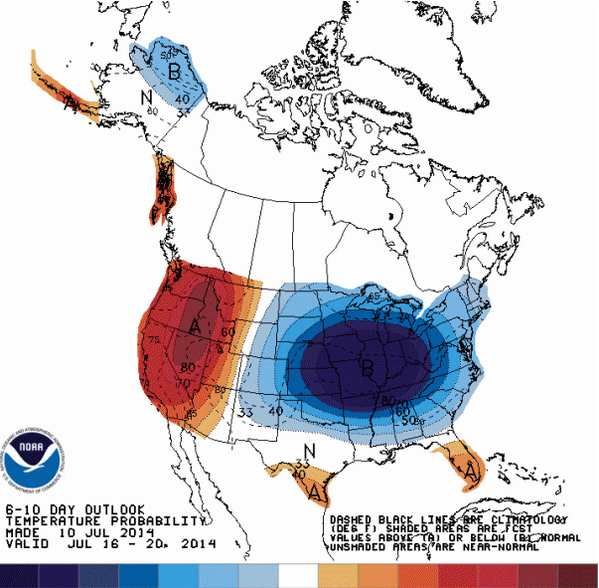'Polar Vortex' Flashback? Experts Say Rare Summer Cold Front on the Way
http://www.nbcnews.com/science/envi...xperts-say-rare-summer-cold-front-way-n153246
Remember last winter's cold spot, which turned "polar vortex" into a phrase that sent chills through the spines of Americans east of the Mississippi River? Get ready for a flashback. This time it's a cool wave sweeping away summer's heat. Morning temperatures could dip into the 50s for many Midwesterners next week, potentially setting seasonal records, according to The Weather Channel.
The Washington Post's Jason Samenow says the weather pattern bears a "haunting resemblance" to January's big freeze. The jet stream is dipping down farther south than usual over the eastern United States, just as it did back then. The cause? It's Typhoon Neoguri, thousands of miles to the west, according to the Weather Underground's Jeff Masters. That storm is sparking a chain reaction of weather shifts, including the Eastern cooldown as well as a strong ridge of high pressure over western North America. That means next week is going to be a hot one in the West.

http://www.nbcnews.com/science/envi...xperts-say-rare-summer-cold-front-way-n153246
Remember last winter's cold spot, which turned "polar vortex" into a phrase that sent chills through the spines of Americans east of the Mississippi River? Get ready for a flashback. This time it's a cool wave sweeping away summer's heat. Morning temperatures could dip into the 50s for many Midwesterners next week, potentially setting seasonal records, according to The Weather Channel.
The Washington Post's Jason Samenow says the weather pattern bears a "haunting resemblance" to January's big freeze. The jet stream is dipping down farther south than usual over the eastern United States, just as it did back then. The cause? It's Typhoon Neoguri, thousands of miles to the west, according to the Weather Underground's Jeff Masters. That storm is sparking a chain reaction of weather shifts, including the Eastern cooldown as well as a strong ridge of high pressure over western North America. That means next week is going to be a hot one in the West.

